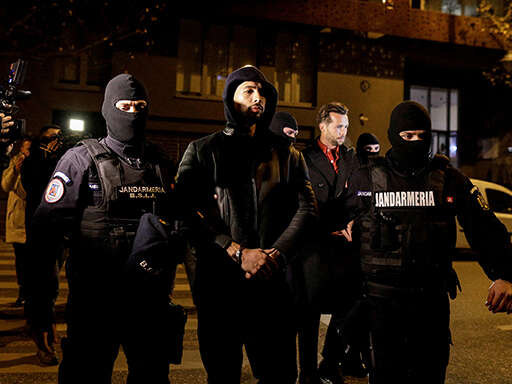
The news that Andrew Tate has been arrested on suspicion of human trafficking, rape and organised crime was met by many over-40s with a blank: “Who is Andrew Tate?” People learning about him for the first time can be shocked to discover he is one of the most famous men in the world.
If you spend your time reading mainstream publications and listening to or watching the BBC, you are likely to have been blissfully unaware of Tate’s existence. But if you spend your time on TikTok, or scrolling through YouTube shorts, you certainly do know who he is. As a member of the generic breed of “internet personality”, Tate’s fame rests less on his previous career as a kick-boxer or his appearance on Big Brother than on his outlandish and misogynistic statements on masculinity.
Tate has mastered the algorithm for short-form video content. He knows that transgressive content sells. He knows that being hated is just as important as being loved (and that the haters and fans fuel each other). Tate’s videos are slick, provocative, sometimes funny and always watchable. His father, Emory Tate, was a brilliant chess player, an American International Master. Andrew is brilliant at the game of internet fame.
Before he was kicked off the main social media platforms (he’s back on Twitter now, with 4.3 million followers), Tate had become a well-known figure, among younger men and boys especially. His videos racked up more than 12 billion views on TikTok. In a survey of 14,500 American teenagers conducted in August and September 2022, Tate was ranked the most important influencer followed by Emma Chamberlain, Kanye West, MrBeast, and Dwayne “the Rock” Johnson. Tate was the third most-searched person online in 2022, after Queen Elizabeth II and Donald Trump.
To say that he has reactionary views about the role of men and women would be an understatement. In some of his videos, women are referred to as “bitches”. He believes that wives become the property of their husbands. Tate also plays into the idea that the world is being controlled by evil forces, using the analogy of The Matrix, a popular trope in the red-pill “manosphere” of online misogynists. After his arrest Tate tweeted simply: “The Matrix sent their agents.”
But the most important question about Tate is why he has acquired such a huge following. (As I write this, his Matrix agents tweet had one million likes.) Most of his audience is unlikely to buy into his most extreme comments, and the hard fact is that a lot of what he says is true and sensible, and not said often enough. Here is part of his message to young men, for example, as expressed to the Fox News host Tucker Carlson: “I think that men’s issues are largely overlooked. The people in charge of the world pretend to care, but when somebody who’s championing men’s issues like myself comes forward and finally manages to garner huge percentiles of the public support I’m silenced. So they’re not really interested in men’s issues and there’s a lot of young men growing up today that feel very disaffected, they feel invisible. . . I basically just say to men: look, it’s a very hard life. You’re gonna need to get up, work hard, go to the gym… get yourself a strong network of brothers… Don’t tolerate men who just smoke drugs and play video games or men who are disloyal or dishonest.”
He’s not wrong. The failure of mainstream institutions, including governments, the media, philanthropy and academia to acknowledge and tackle the real problems facing many boys and men has created a vacuum in our politics and in our culture. This is a vacuum that populist politicians like Donald Trump can fill at the ballot box. And it is a vacuum that internet performers like Tate can fill online. It is tempting to simply de-platform men like Tate, and cut off the supply of this kind of content, but the deeper challenge is to reduce the demand. Millions of boys and men are desperate for help answering the question of what it means to be a good man today. If we don’t like Tate’s answer, we need a better one ourselves.
[See also: Richard Reeves: “We have to rescript masculinity”]






